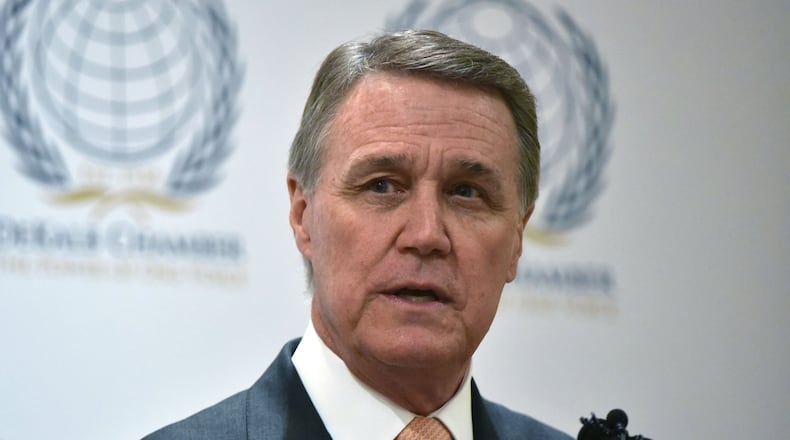As this year’s midterm battles were heating up, U.S. Sen. David Perdue was quietly laying the groundwork for another crucial campaign: his own re-election bid in 2020.
The businessman who surged to office on his outsider credentials in 2014 is preparing for a vastly different sort of election, this one as an incumbent with a growing voting record and deep ties to President Donald Trump.
The jean-jacketed Republican is a novice politician no more, despite his protests otherwise, and his team is girding for what’s expected to be a costly and brutal race.
Democrats are eager for their first Senate win since Zell Miller retired in 2004, and Stacey Abrams may be the foremost contender after her narrow defeat in the race for governor. But some other prominent Democrats are also weighing a bid.
Running for what he vows will be his final term, Perdue plans to return to the same theme that propelled his underdog bid for office four years ago: Washington is in desperate need of a course correction.
Perdue is betting that his country boy-turned-CEO image will still appeal to voters in the state’s conservative rural swaths and politically competitive suburbs, putting a check on some of the Democrats’ midterm gains.
But his biggest political advantage – his close relationship with Trump – could also be a liability with moderate voters who loathe the president and punished Republicans across metro Atlanta’s fast-growing suburbs in November for sticking by him.
In an interview, Perdue previewed a campaign message that blends his close relationship with the White House – with a heavy emphasis on his knack for channeling Trump’s policies –and the anti-Washington appeal that propelled him to victory four years ago.
“Nothing’s really changed, in my perspective,” he said. “I’m right now the outsider in the belly of the beast. You see my frustration with how both sides conduct themselves: Washington is broken and if you want different results you’ve got to send different people.”
He said he will remain one of Trump's most steadfast defenders on Capitol Hill — he once compared him to Winston Churchill — as Democrats circle Georgia as a 2020 battleground state.
“I believe my role right now is to run as myself. I’m David Perdue. I’m not Donald Trump. I support him and his agenda. And when we disagree – well, believe me, we have private conversations about it,” he said, adding: “I’ve never tried to be a yes man. I’ve tried to be an honest broker.”
His top adviser, Derrick Dickey, put a finer point on it.
“No one Trumpsplains,” he said, “better than David Perdue.”
‘The transformation’
Abrams would be the Democratic front-runner if she jumps into the race – and may well scare off any competitor. But she’s not betrayed any hint about whether she will challenge Perdue, as some party leaders urge, or seek a rematch in 2022 against Gov.-elect Brian Kemp.
In an interview, Abrams was quick to highlight Democratic gains in once-solid Republican territory in Cobb, Henry and Gwinnett counties where her party can “absolutely complete the transformation that we started this year” in the next election cycle.
“There are counties like that across the state that simply need more investment, more attention and more energy. And we will continue to provide that,” she said. “Because I believe that Georgia is on the path to progress – and I intend to be a part of that.”
No matter her decision, a constellation of other Democratic figures has already been orbiting the race.
At the top of that list is Columbus Mayor Teresa Tomlinson, who has presented herself as a progressive who can also appeal to parts of rural Georgia where Democrats got clobbered in the midterm.
“In the 2020 race, Democrats have an opportunity to demonstrate how progressive policies bridge the gap between metro Atlanta and the rest of Georgia,” she said. “We are looking for a senator well-steeped in both communities – a senator who understands how to be accessible and make the federal government work for, not against, Georgians.”
Democrats could also look beyond their bench of elected officials. One option for some party leaders is the Rev. Raphael Warnock, a leading voting-rights advocate who is pastor of Ebenezer Baptist Church – the spiritual home of Martin Luther King Jr.
He flirted with a Senate bid in 2016 before deciding to stay in the pulpit. But his supporters see him as an outsider who could forcefully denounce Trump while exciting the state's black electorate much like Abrams did.
Warnock is not ruling out a bid, contending that Georgia’s changing demographics are the reason Republicans “have engaged in a rabid campaign of voter suppression.
"That said, the Democratic gains in the Legislature and the ouster of the incumbent in a reliably Republican congressional district suggest that others can also be sent packing, as the people stand up to embrace a progressive vision and a more inclusive economy," he said. "It's the right time. We just need the right candidate."
Count Jon Ossoff, who built a national profile in last year’s epic 6th District race, among the Democrats waiting for Abrams to decide before making a move. Ossoff, who used his vast fundraising list to help Abrams and down-ticket suburban candidates, hasn’t ruled out a bid. But the investigative journalist said he’d “like to see Stacey challenge Perdue.”
Sally Quillian Yates, the former acting U.S. Attorney General, has passed on a run, but some other big names could jump in — along with some lower-profile candidates.
State Rep. Scott Holcomb, an attorney and U.S. Army veteran, has picked a string of social media fights with Perdue, who he delights in calling an “empty suit who does what he’s told by an unpopular and weak president.”
Holcomb previewed a likely Democratic attack on Perdue, saying “the only thing he’s done on the issue he ran on – cutting debt – was to make it worse.”
‘Wake up call’
A former Dollar General and Reebok chief executive, Perdue shook up an already-crowded field to succeed the retiring U.S. Sen. Saxby Chambliss when he announced his candidacy in July 2013.
He promptly vowed to overhaul the tax code and rein in the national debt, and distinguished himself with a memorable ad that depicted his opponents as whining babies and himself as an above-the-fray businessman with a denim jacket.
Helped by deep pockets and a famous last name — his first cousin is former Gov. Sonny Perdue — the political newcomer railed against entrenched D.C. interests and career politicians on the campaign trail, painting himself as an establishment-shaking newcomer without any political baggage.
He shocked that establishment by besting 11-term Savannah Congressman Jack Kingston in the GOP runoff and soundly defeating Democrat Michelle Nunn in a general election battle many predicted would be far more competitive.
Now Perdue will likely have the advantage of a clear GOP field. He enjoys rock-star status among Georgia conservatives, and no well-known Republican has publicly floated the idea of challenging him. He has a respectable $1.2 million in his campaign coffers, as well as close allies serving in senior positions in the Trump administration and Georgia GOP.
One defense Perdue won’t be able to rely on as heavily is his greenness. He was able to move past his biggest gaffes in his 2014 contest by arguing he wasn’t a politician. But that explanation will be harder to lean on after several years in the U.S. Senate.
And Democrats seem sure to resurface several recent head-slapping moments, including his snatching of a Georgia Tech student's cellphone and comparing Democratic critics of Justice Brett Kavanaugh's to Nazi Brownshirts. (Perdue apologized for the latter and attributed the former to a selfie-related misunderstanding.)
He now also has a voting record that his opponents can try to pick apart — including two years under unified GOP control of government, which will make it harder for him to explain his legislative losses.
Despite railing against the country's mounting deficits, he emphatically supported his party's tax cuts, which are projected to add $1.9 trillion to the national debt over the next decade, as well as a $320 billion budget deal. A legal immigration overhaul he co-authored last year was labeled by Democrats and some Republicans as overly strict and ultimately shelved.
Perdue will highlight legislation proving he's been getting results. That includes fresh federal commitments for parochial priorities such as the Savannah harbor expansion project and Robins Air Force Base, as well as the economic benefits of the GOP tax cuts and the rollback of the Dodd-Frank financial regulatory law.
Perdue won’t hesitate to frame his Democratic opponents the way Republicans did with Abrams’ gubernatorial bid: extreme, radical and more in line with the values of California than Georgia.
But he hasn’t spared criticism of his own party, blasting the “lousy job” by Georgia Republicans to amplify their message. He calls Kemp’s tight election victory a blaring “wake- up call to Republicans who believe in conservative governance.”
Still, he cautions that the dynamics of the 2020 race will change dramatically over the next two years as politicians confront a different political landscape.
Trump carried Georgia by a 5-point margin in 2016 even without visiting the state after the presidential primary. That seems certain to change if Democrats target Georgia in 2020, triggering a Republican scramble to fortify the state.
Perdue, for his part, seems at ease with the coming balancing act of defending Trump while waging his own re-election campaign.
“He’s trying to change the direction, and when he tries to do that, it’s messy and he breaks eggs,” he said of Trump. “I don’t agree with the president on 100 percent of what he does, but I try to look past what he says and look at what he does.”
David Perdue
Age: 68
Home: Sea Island
Education: Bachelor’s degree from Georgia Tech, 1972; Master’s degree from Georgia Tech, 1975.
Occupation: Businessman. Co-founded Perdue Partners LLC, a global training company, with first cousin and former Gov. Sonny Perdue; chief executive of Dollar General, 2003-2007; chief executive of Pillowtex Corp., 2002-2003; chief executive of Reebok, 2001-2002; also was an executive with Haggar Inc. and Sara Lee Corp. in Hong Kong
Political experience: One term in the U.S. Senate
Family: Married 40 years to Bonnie; two children; three grandchildren
Keep Reading
The Latest
Featured




